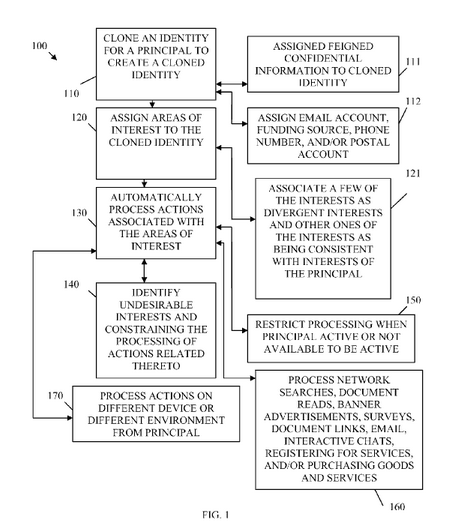Apple Wants to Protect Your Identity ... by Cloning You
The company just acquired a patent aimed at fighting the Internet's "Little Brothers."
The company just acquired a patent aimed at fighting the Internet's "Little Brothers."
![[optional image description]](https://cdn.theatlantic.com/media/mt/science/apple_dup615.jpg)
It's common to worry about Big Brother. But what about ... Big Brother's brothers?
The electronic age has given rise to what is now known as thousands of "Little Brothers," who perform Internet surveillance by collecting information to form electronic profiles about a user not through human eyes or through the lens of a camera but through data collection. This form of Internet surveillance via data collection is often referred to as "dataveillance." In a sense, thousands of "Little Brothers" or automated programs can monitor virtually every action of users over the Internet.
That colorful analysis comes not from an EFF essay or a New York Times op-ed, but from a patent -- one just assigned to Apple. One of the properties Apple won in a February acquisition of patents from Novell, the technology allows the company to fight would-be Little Brothers by cloning users' digital identities. The system -- in more traditional Patent-ese, a "non-transitory computer-readable implemented method to process on a device" -- works in three ways. First, it creates a fake identity (and, actually, many fake identities) for the user. Second, it takes elements of users' real identities -- interests and the like, based on browser history and cookies -- and merges those with elements that don't reflect the identity of the user, creating a close-but-not-quote shadow identity. Third, it creates actual network activity based on those false interest areas, spreading them across the network.
So: digital pollution, with a purpose. Apple is taking advantage -- or, well, could take advantage -- of the practically limitless storage space offered by the Internet to fool the people who try to make that Internet smaller. The overall point, the patent text notes, is to "make any data collection about a principal less valuable and less reliable."
Here's the illustration:
So should you expect there to be some "Toddlers in Tiaras"-watching/Justin Bieber-loving/puppy-hating versions of yourself lurking out there in the cloud, mimicking and thereby protecting you? Not just yet. Apple now has the patent for the cloning technology; what they'll do with it remains to be seen. The company could sit on it, as it does on so many other pieces of its intellectual property; on the other hand, it could also build it out as a standard privacy protection feature in iCloud and other Apple products, offering one step forward in the cat-and-mouse game of identity protection. Either way, Apple's latest IP acquisition offers yet one more paradox of the sometimes-weird world of technology: Protecting our identities, it says, may be as simple as replicating them.

